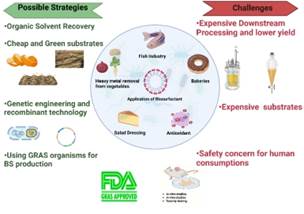Ministry of Science & Technology
Safe microbial substitute can replace synthetic surfactants in the food industry
प्रविष्टि तिथि:
14 AUG 2024 4:49PM by PIB Delhi
Cost-effective biosurfactants, a healthier substitute for synthetic surfactants useful for the food industry, can be produced using green substrates from agro-industrial waste.
Surfactants are molecules that slither across surfaces of oil and water, water and oil, or air and water to form an emulsion. Surfactants are very useful in the food industry as lubricants and foamers to emulsify fats in batters, improve shelf life, as dispersing agents, and retain moisture. However, the accelerated usage of synthetic food additives and emulsifiers in dietary goods has led to imbalances in the microbiome of the body, gut-related disorders and affect the intestinal barrier permeability leading to declination of beneficial microbiota. Therefore, an alternative option is essential.
Microbial biosurfactants obtained from various microbial sources exhibit high emulsification, solubilization, foaming, adsorption, and other physical characteristics. Also, they are very stable in a wide range of pH, temperature, and salinity, making them suitable for food applications. Biosurfactants are eco-friendly biomolecules and do not impart toxic effects; therefore, they can be considered safe for human consumption.
A research group led by Prof. Ashis K Mukherjee, Director, IASST, Prof. M. R. Khan and Anushree Roy from IASST, Guwahati, critically analyzed the application of biosurfactants in food industries, highlighting the challenges in the large-scale commercialization of biosurfactants. In the food industry, besides bakeries and salad dressings, biosurfactants can be used for heavy metal removal from vegetables to boost immunity in fish, providing a protective effect against the pathogen. Also, it can be employed in food products as a natural antioxidant to prevent early spoilage. Their work has been published in the Journal Food control (Elsevier).
The study explores using green substrates from agro-industrial waste for cost-effective biosurfactant production, utilizing genetic engineering, recombinant DNA technologies, and nanotechnology to improve yield. This study also suggested an in-depth toxicological study, dose assessment, and synergic effects of biosurfactants with other food components to charter approvals for food inclusion. In this regard, researchers need to focus on safety assessment and less expensive, state-of-the-art technologies in coordination with the industrialists to maximize biosurfactants' production and expand their market space.
Publication Link: https://doi.org/10.1016/j.foodcont.2024.110465

***
KSY/PSM
(रिलीज़ आईडी: 2045272)
आगंतुक पटल : 1944